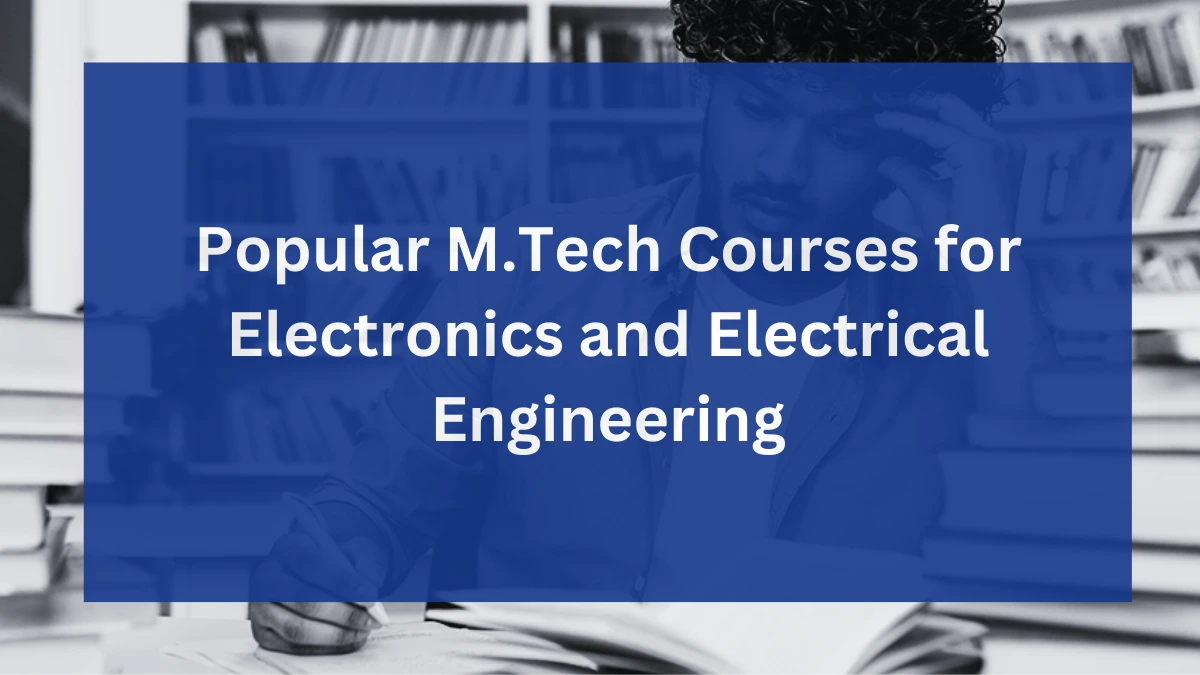Popular M.Tech Courses for Electronics and Electrical Engineering
Once the GATE exam is over, the GATE aspirants have a few common questions, such as: What are popular M.Tech specialisations in Electronics and Electrical Engineering? What are the criteria for choosing these specialisations? What will they study in their coursework for their Masters? What key factors affect the decision-making for selecting a particular specialisation during counselling rounds?

A Master of Technology (M.Tech) degree offers engineers the opportunity to specialize in advanced areas of their field, enhancing their knowledge and career prospects. Electrical Engineering (EE) and Electronics & Communication Engineering (ECE) professionals have several specialization options, each with vast scope and career opportunities in academia, industry, and research.
How to choose a specialization?
In B.Tech, you must have gone through several subjects; for example, if we consider Electrical Engineering, Electrical students must have gone through Power Electronics, and in that subject, you must have read from the basic to advanced level of concept application for that particular subject, but when it comes to M.Tech, these particular subjects becomes an area of research particularly known as specialization.
M.Tech Specialization: Future Scope & Top Institutes
Microelectronics & VLSI Design
Scope:
- Focuses on semiconductor technology, chip design, and fabrication.
- Huge demand in semiconductor giants like Intel, AMD, TSMC, and Qualcomm.
- Career opportunities in R&D labs and electronics manufacturing industries.
- Expected to create 10 lakh jobs by 2030.
Best IITs & NITs:
- IISC Bangalore, IIT Bombay, IIT Madras, IIT Delhi, IIT Kharagpur
- NIT Trichy, NIT Warangal, NIT Calicut
Power Electronics & Drives
Scope:
- Applications in electric vehicles (EVs), renewable energy, industrial automation, and consumer electronics.
- High demand in companies like Tesla, ABB, Siemens, and Schneider Electric.
- Research opportunities in energy-efficient devices and converters.
- Up to 80% of electric power worldwide is anticipated to rely on power electronics by 2030.
Best IITs & NITs:
- IIT Delhi, IIT Bombay, IIT Kanpur, IIT Roorkee
- NIT Trichy, NIT Surathkal, NIT WarangalRead More: MTech Admission Process
Power Systems Engineering
Scope:
- Focuses on power generation, transmission, distribution, and smart grid technologies.
- Career opportunities in power plants, renewable energy companies and smart grid technology firms.
- Research opportunities in improving energy efficiency and sustainability.
- By 2030, India’s renewable energy sector will create 3.5 million jobs.
Best IITs & NITs:
- IIT Delhi, IIT Bombay, IIT Kanpur, IIT Madras
- NIT Trichy, NIT Warangal, NIT Surathkal
Control Systems Engineering
Scope:
- Deals with automation, robotics, and process control.
- Key roles in industries like aerospace, manufacturing, defense, and automotive.
- Opportunities in R&D labs for AI-driven control applications.
- By 2030, Control Systems Engineers will be at the forefront of automation, AI-driven technologies, and cyber-physical systems.
Best IITs & NITs:
- IIT Kharagpur, IIT Bombay, IIT Madras
- NIT Trichy, NIT Warangal, NIT Calicut
Communication Systems
Scope:
- Deals with wireless communication, satellite communication, and IoT networks.
- Career prospects in telecom giants like Ericsson, Nokia, Qualcomm, and ISRO.
- Research opportunities in 5G/6G, optical networks, and satellite technology.
- By 2030, India will require 22 million skilled workers in 5G-focused industries such as cloud computing, robots, and the Internet of Things (IoT).
Best IITs & NITs:
- IIT Madras, IIT Bombay, IIT Delhi, IIT Kanpur
- NIT Trichy, NIT Warangal, NIT Rourkela
Embedded Systems & IoT (ECE)
Scope:
- Application in smart devices, automotive electronics, and home automation.
- High demand in companies like Bosch, Texas Instruments, ARM, and Samsung.
- Research in AI-powered embedded solutions and smart automation.
- World Economic Forum, “Future of Jobs Report 2025” identifies IoT specialists among the top 10 fastest-growing job roles by 2030
Best IITs & NITs:
- IIT Madras, IIT Bombay, IIT Hyderabad, IIT Kharagpur
- NIT Trichy, NIT Surathkal, NIT Calicut
Signal Processing & Machine Learning
Scope:
- Applications in AI, biomedical imaging, speech processing, and automation.
- Job roles in companies like Google, NVIDIA, Apple, and defense R&D organizations.
- Research in real-time AI applications and deep learning-based signal processing.
- By 2030, Signal Processing & Machine Learning (ML) jobs in India are expected to grow significantly, driven by advancements in AI, 5G/6G, IoT, and edge computing
Best IITs & NITs:
- IIT Bombay, IIT Madras, IIT Delhi, IIT Hyderabad
- NIT Trichy, NIT Warangal, NIT CalicutRead More: IIT Bombay MTech admission
RF & Microwave Engineering
Scope:
- Focuses on antenna design, radar systems, and satellite communication.
- Key roles in defense organizations, ISRO, DRDO, and telecom companies.
- Research opportunities in 5G antennas and satellite-based communication systems.
- With the rapid evolution of 5G, 6G, satellite communication, IoT, and defense technologies, the demand for RF & Microwave Engineers in India is set to grow significantly by 2030.
Best IITs & NITs:
- IIT Kharagpur, IIT Bombay, IIT Madras, IIT Delhi
- NIT Trichy, NIT Warangal, NIT Surathkal
Conclusion
Choosing the right M.Tech specialization is crucial for career growth in Electrical and Electronics & Communication Engineering. Candidates should select based on their interests, career aspirations, and the research facilities available at the institute. IITs and NITs are the best institutions offering cutting-edge research and industrial collaborations, ensuring excellent career opportunities.






